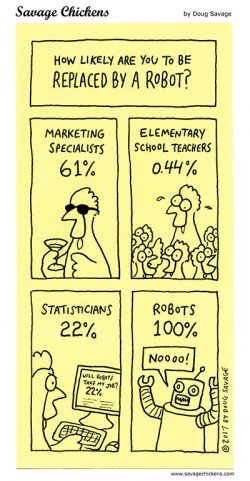“I say something, and then it usually happens. Maybe not on schedule, but it usually happens.”–Elon Musk
Who knew? Elon Musk is actually capable of being realistic about his unrealistic timelines. My projections for the two Elon pronouncements of the week? Maybe sometime in the next 200 years for the first one. Definitely sometime in the next 200 million years for the second one.
While you’re reading about all this week’s future-related news, don’t forget that you can subscribe to Seeking Delphi™ podcasts on Apple Podcasts, PlayerFM, or YouTube (audio with slide show) and you can also follow us on Twitter and Facebook.
Hear Seeking Delphi™ host Mark Sackler’s views on the future, and how we should think about it, on Matt Ward’s podcast, The Disruptors, episode #131.

Elon is serious!
Elon Musk–‘Ol Elon is up to his old tricks. He’s again advocating we teraform Mars by nuking its dry ice polar caps. He must be serious because he even has a tee shirt to promote it.
While he’s advocating we ravish Mars, Elon is also warning that an asteroid will eventually get us here on Earth. Really? That can’t happen, can it? Just ask a dinaso–oh, wait.
NASA/Space Exploration–NASA’s on-again, off-again mission to Jupiter’s icy moon, Europa, appears to be back on. The agency has confirmed a mission to launch a probe there sometime between 2023 and 2025.
AI/BCI–As demand for AI software and chips continues to escalate, it isn’t all a bed of roses. IEEE says there is both opportunity and peril for makers of specialized A.I. chips.
–Elon Musk’s Neuralink–among others–is proposing to implant computer chips in the brain, initially to control neurological disorders. But Susan Schneider, a prominent University of Connecticut cognitive scientist and techno-philosopher, is warning that adding artificial intelligence to BCI (brain-computer interface) may not be such a good idea. You can hear Dr. Schneider, speaking on conscious machines at last years South by Southwest conference, in the Seeking Delphi episode linked HERE.

Hold the anchovies, please
Robotics/autonomous vehicles–Unemployment is about to strike the ranks of pizza delivery drivers on U.S. college campuses. Starship technologies has raised $40 million to fuel the nationwide rollout of its army of autonomous delivery robots, starting with George Mason University and Northern Arizona University.
—China is accelerating its push to challenge U.S. technology in self-driving cars, and has dediated an isolated mountain highway for testing of the vehicles. They hope to have at least 50% of all new car sales to include smart technology as soon as next year.
–Ever one of the most forward looking states on the planet, Singapore will begin testing driverless busses next week. And of course, rides can be booked via an app.
Seeking Delphi™ podcasts are available on Apple Podcasts,, PlayerFM, or YouTube (audio with slide show) and you can also follow us on Twitter and Facebook













